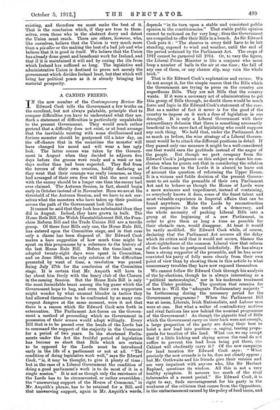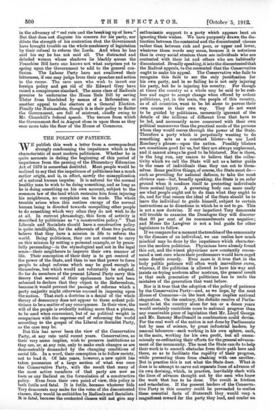A CANDID FRIEND.
IN the new number of the Contemporary Review Sir Edward Cook tells the Government a few truths on the excellent, but not always palatable, principle that to conquer difficulties you have to understand what they are. Such a statement of difficulties is particularly unpalatable to the present Government. They would much rather pretend that a difficulty does not exist, or at least arrange that the inevitable meeting with some disillusioned and furious monster should be postponed till a later day, on the off-chance that in the meantime the monster will have changed his mood and will wear a less ugly look. The latter course was taken by the Govern- ment in August when they decided to adjourn five days before the grouse were ready and a week or ten days earlier than had been -expected. They fled from the terrors of their own creation, boldly declaring as they went that their courage was really immense, as they had arranged of their own free will that the next round with the enemy should be a longer one than the enemy had ever claimed. The Autumn Session, in fact, should begin early in October instead of in November. Here we are at the threshold of the Autumn Session, and we have to ask our- selves what the monsters who have taken up their position across the path of the Government look like now.
It cannot be said that they look less substantial than they did in August. Indeed, they have grown in bulk. The Home Rule Bill, the Welsh Disestablishment Bill, the Fran- chise Reform Bill and the Trade Unions Bill are a terrific group. Of these four Bills only one, the Home Rule Bill, has entered upon the Committee stage, and in that case only a clause has been disposed of. Sir Edward Cook makes a bare suggestion of how much time might be spent on this programme by a reference to the history of the last Home Rule Bill. Before the time-limit was adopted twenty-eight days were spent in Committee, and on June 30th, as the only solution of the difficulties presented by want of time, a resolution was passed fixing July 27th for the conclusion of the Committee Stage. It is certain that Mr. Asquith will have to lay about him freely with the heavy club of the Closure in the coming Session. But the Home Rule Bill is only the most formidable beast among the big game which the Government hope to bag, and even their own supporters might wonder by what unusual blunder in tactics they bad allowed themselves to be confronted. by so many con- vergent dangers at the same moment, were it not that there is a reason which Sir Edward Cook sets forth in extenuation. The Parliament Act forces on the Govern- ment a method of proceeding which no Government in possession of their senses would adopt willingly. Every Bill that is to be passed over the heads of the Lords has to command the support of the majority in the Commons for a period of two years. In the shortened Parlia- ments under the Act the fruitful period of legislation has become so short that Bills which are certain to be opposed by the Lords must be introduced early in the life of a parliament or not at all. " The condition of doing legislative work well," says Sir Edward Cook, "is, it may be thought, to give it plenty of time ; but in the case of a Liberal Government the condition of doing a good parliament's work is to do most of it in a single session." It is not as though only the resistance of the Lords has to he circumvented, or rather overridden ; the "unswerving support of the House of Commons," in Mr. Asquith's phrase, has to be retained for a Bill, and that unswerving support, again in Mr. Asquith's words, depends "in its turn upon a stable and consistent public opinion in the constituencies." That stable public opinion cannot be reckoned on for very long ; thus the Government are compelled to offer their Bills in a bunch. As Sir Edward Cook puts it : " The sheaves in every field have to be left standing, exposed to wind and weather, until the end of the period ordained by the Parliament Act. The crops of 1912 cannot be garnered till 1914. Or, to vary the figure, the Liberal Prime Minister is like a conjurer who must keep a number of balls in the air at one time ; the fall of any one of them, or any chance slip, may ruin the whole trick."
That is Sir Edward Cook's explanation and excuse. We do not accept it, for the simple reason that the Bills which the Government are trying to press on the country are superfluous Bills. They are not Bills that the country wants. If it were a necessary act of administration to get this group of Bills through, no doubt there would be much force and logic in Sir Edward Cook's statement of the case. But as a matter of fact it never is for the good of the country to impose on it such a dose of legislation in one draught. It is only a Liberal Government with their extraordinary delusion that there is something necessarily beneficial in the mere fact of legislating who could suppose any such thing. We hold that, under the Parliament Act as much as before, the wise strategy of a Liberal Govern- ment would be to attack the different positions in detail. If they passed only one measure it might be a well-considered one that would earn the gratitude instead of the anger of the people. But though we part company from Sir Edward Cook's judgment on this subject we share his con- clusion when he points out that in considering the relation of the Commons to the Lords it is absurd to leave out of account the question of reforming the Upper House. It is a vicious and futile decision of the present Govern- ment to set aside the preamble of their own Parliament Act and to behave as though the House of Lords were a mere nuisance and impediment, instead of containing, as everybody knows it does, some of the finest talent and most valuable experience in Imperial affairs that can be found anywhere. Make the Lords by reconstruction more responsive to the needs of a democracy, and the whole necessity of packing Liberal Bills into a group at the beginning of a new Parliament, in order to give them as long a time as possible for their obstacle race, would disappear. At least it would be vastly modified. Sir Edward Cook while, of course, declaring that the Parliament Act secures all the delay which its critics said that it would not secure, blames the short-sightedness of the common Liberal view that reform of the Lords can be postponed indefinitely. He has always been a strong supporter of the preamble, and he has never convicted his party of folly more clearly from their own point of view than by showing them in this article to what unnecessary troubles they have now exposed themselves.
We cannot follow Sir Edward Cook through his analysis of the by-elections, though he is always interesting as a " political meteorologist," nor in his moderate treatment of the Ulster problem. The question that remains for us here is : Will the "adequate Parliamentary majority " be forthcoming during the necessary period for the Government programme ? When the Parliament Bill was at issue, Liberals, Irish Nationalists, and Labour men were at one. But what a welter of contradictory motives and rival factions lies now behind the nominal programme of the Government 1 As though the gigantic load of Bills which the Government carry on their back were not enough, a large proportion of the party are doing their best to hoist a new load into position—a raging, tearing propa- ganda for taxation of the land. What can we say except that if a little kicking and shying across the road do not suffice to prevent the load from being put there, the Cabinet will obediently carry it ? Of the new campaign for land taxation Sir Edward Cook says: " What precisely the new crusade is to be, does not clearly appear ; but Mr. Outhwaite and his friends give their version and are very impatient with anyone who, like Sir Herbert Raphael, questions its wisdom. All this is not a very healthy symptom. It savours too much of the rival tabernacles of a recent period." Sir Edward Cook, it is right to say, finds encouragement for his party in the weakness of the criticism that comes from the Opposition, in the embarrassment caused by the policy of food taxes, and in the advocacy of " red ruin and the breaking up of laws." But that does not disguise his concern for his party, nor dilute the strength of his contention that the Government have brought trouble on the whole machinery of legislation by their refusal to reform the Lords. And when he has mid his say he has not said all. The distracted and deluded women whose shadows lie blackly across the Franchise Bill have one knows not what surprises yet to spring upon the Government to add to the general con- fusion. The Labour Party have not swallowed their bitterness, if one may judge from their speeches and action in the recess. The cave men who wish to invert our foreign policy and get rid of Sir Edward Grey have raised a conspicuous standard. The same class of Radicals promise to undermine the Home Rule Bill by saving Ulster from bloodshed by means of a Referendum or another appeal to the electors at a General Election. Finally the Nationalists, though it is their policy to flatter the Government, are full of mistrust, chiefly owing to Mr. Churchill's federal speech. The terrors from which the Government fled in August close in upon them as they once more take the floor of the House of. Commons.



































































 Previous page
Previous page